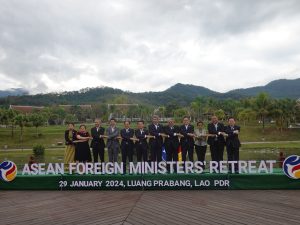Myanmar’s military junta has sent a senior official to a major meeting of the Association of Southeast Asian Nations (ASEAN) for the first time since late 2021.
According to reporters, Marlar Than Htaik, the permanent secretary of Myanmar’s Ministry of Foreign Affairs, is attending this week’s ASEAN Foreign Ministers’ Retreat in Laos. The two-day informal meeting, which opened today in Luang Prabang, is the first major event on ASEAN’s schedule for 2024.
As has been the case for the three years since the Myanmar military’s February 2021 coup d’état, the country’s troubles are likely to be high on the agenda at this
The attendance of a Myanmar junta representative at a major ASEAN gathering, on the eve of the third anniversary of the coup that plunged the country into chaos, does not necessarily mark a shift on ASEAN’s part.
Since the October 2021 ASEAN Summit, which was hosted by Brunei and took place via videolink, the Southeast Asia bloc has barred junta leader Senior Gen. Min Aung Hlaing and other leaders from attending high-level ASEAN summits. This policy was introduced due to the junta’s near-total lack of effort to implement the organization’s Five-Point Consensus peace plan, formulated in April of that year, which called for an immediate cessation of violence and the convening of inclusive political talks including “all parties” to Myanmar’s conflict.
However, ASEAN has always left open the option of the military administration sending a “non-political representative” to attend these meetings, something that the junta has declined in protest up until this point. (Ahead of the 2022 ASEAN Foreign Ministers’ Retreat in Cambodia, the first of these meetings from which the junta’s foreign minister was excluded, the junta said that it would prefer not to participate in the meeting than to send a “non-political” representative, saying that it was opposed “in principle” to ASEAN’s decision to bar its top leaders.)
The question is why the generals in Naypyidaw have finally decided to take ASEAN up on its invitation. Recent months have certainly seen the regime’s fortunes darken, with resistance groups taking significant ground across the country, particularly in western Myanmar and in the northern part of Shan State along the border with China.
In these circumstances, it is possible that the increasingly straitened junta is seeking to normalize relations with ASEAN in order to reduce the pressure and buy itself more time to crush the resistance or engineer a political resolution on its own terms. However, there is little evidence that Myanmar’s military is suddenly willing to implement the Five-Point Consensus in good faith. Indeed, its continuing deployment of lethal violence against both the resistance and perceived back-stabbers in its own ranks suggests much the opposite.
It is also possible that Marlar Than Htaik’s attendance was a result of new ASEAN special envoy Alounkeo Kittikhoun’s recent visit to Myanmar, which came less than two weeks after he took up the post at the start of the year. During the visit, the former Lao deputy foreign minister met with a number of senior officials, including Min Aung Hlaing, with whom he reportedly discussed “efforts of the government to ensure peace and stability of the State and national reconciliation.”
On the social media platform X (formerly Twitter), Leong Wai Kit of Channel News Asia quoted ASEAN Secretary General Kao Kim Hourn as saying that Alounkeo had briefed the meeting about his recent mission to Myanmar, and suggested that there had been progress on the country’s conflict. He said that the day’s meetings had been “good” and that “we are always ready to help Myanmar.”
Whatever the situation, it is unlikely that ASEAN’s form of constructive engagement will yield substantial fruit after nearly three years in which this approach has been tried and failed. The situation on the ground in Myanmar has changed considerably in recent months, but perhaps not yet enough to prompt anything but tactical reassessments in Naypyidaw’s cloisters of power.

































